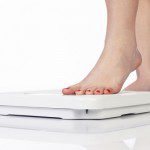 Here it comes, the dreaded scale discussion. And, believe it or not, it’s not going to be that bad. To start, scales are not meant, in any way, to be scary or to haunt you. Nor should they rule your life or make you feel bad about yourself.
Here it comes, the dreaded scale discussion. And, believe it or not, it’s not going to be that bad. To start, scales are not meant, in any way, to be scary or to haunt you. Nor should they rule your life or make you feel bad about yourself.
But, they can offer an approximate measurement of your body mass. Given there are two sides to the scale, we will take a scientific look at both. We’ll guide you in deciding whether daily weight tracking will help or hinder your health goals.
Side A: Helpful for weight loss
A new study suggests that daily weigh-ins paired with weight loss support education may be key to “an improved adoption of weight control behaviours” that help to sustain long-term weight loss goals (1). The study evaluated weight loss success in 47 overweight men and women randomised to either daily weigh-ins paired with weight loss reinforcement lessons or randomised to unstructured weigh-ins without weight loss education.
Over a period of six months, those weighing in daily who were reinforced with weight loss education lost five to six kilograms, which was three kilograms more than the individuals who were not required to weigh in daily. Not only did the daily weight trackers lose more weight, but they also adopted 17 meaningful weight loss behaviours and stuck with them (1).
In a similar study, researchers observed the behaviours of 40 overweight individuals seeking to lose weight. They also compared the continuity of daily weigh-ins to weight lost and gained. It was found that those individuals weighing in daily lost more weight. Those individuals not weighing in for more than one week’s time actually gained weight (2). So here you have it, the scale can be a helpful tool and for some, daily weight tracking paired with other healthy behaviours supported weight loss. But, this might not be true for you. That is why we must consider side B of the scale.
Side B: Harmful for health
In a recently published issue of the Journal of The American College of Nutrition, researchers questioned the issue of being weighed and subsequent eating behaviours. They weighed a group of people before administering a dietary questionnaire and weighed a different group after they completed the same questionnaire. It turns out that those who were weighed before answering diet-related questions exhibited a greater desire for dietary restraint than those answering the questions without an idea of current weight.
These results, although allowing for wide interpretation, do prove that body weight tracking does promote awareness leading to a greater degree of dietary restraint (3). For some, a certain amount of dietary restraint is useful in reaching specific health goals, while for others; dietary restraint can lead to disordered dietary habits and to other body image related diseases.
In the United States, 24 million people suffer from an eating disorder and experience the highest rates of death among the spectrum of mental illness (4). And, sadly, this alarming statistic does not include individuals struggling with body dysmorphia disorder who are reported to have a suicide rate 45 times higher than average (5).
The scale unfortunately plays a role in these diseases, as chronic weight checking is a telling clue medical professionals use to help identify and diagnose these disorders. The question “do you weigh in daily?” and other questions related to obsessive weight tracking are listed on disordered eating and disordered body image perception questionnaires (6).
Although losing weight to improve health might be necessary for some, others can become unhealthily preoccupied by it. The number on the scale can also translate unhealthily and trickle down to how many bites of food or laps around the block are allowed or required. These are only some examples of scale-driven preoccupations that harm both men and women (5).
Striking balance
Based on current scientific literature, the question of daily weigh-ins remains conflicted. On one side, proving very helpful for weight loss and, on the other side, posing great risks to certain individuals resulting in severe negative psychological consequences (7). So now, it is your turn to question your own weight loss motivations and purposefully decide whether daily weigh-ins are really a good weight loss tool for you. Stay healthy!
References
- Steinberg D, Bennett G et al. Weighing every day matters: daily weighing improves weight loss and adoption of weight control behaviors. J Acad Nutr Diet. 2015.
- Helander E, Vuorinen A, Wansink B et al. Are breaks in daily self-weighing associated with weight gain? PLoS ONE.2014:9:11.
- Pacanowski CR, Sobal J, Levitsky DA, Sherwood NE, Keeler C, Miller AM et al. Does measuring body weight impact subsequent response to eating behavior questions? J Amer College of Nutri. 2015. 03.09.
- National Association of Anorexia Nervosa and Associated Eating Disorders. Eating disorder statistics. 2015. Anad.org.
- Health Research Funding Organization. Body Dysmorphic Disorder Statistics. 2014. Healthresearchfunding.org
- National Eating Disorders Association. Disorder Eating Screening. Mybodyscreening .org
- VanWormer J, French SA, Pereira MA et al. The impact of regular self-weighing on weight management: a systematic literature review. Int J of Behav Nutri Phys Activ. 2008. 5:54.


